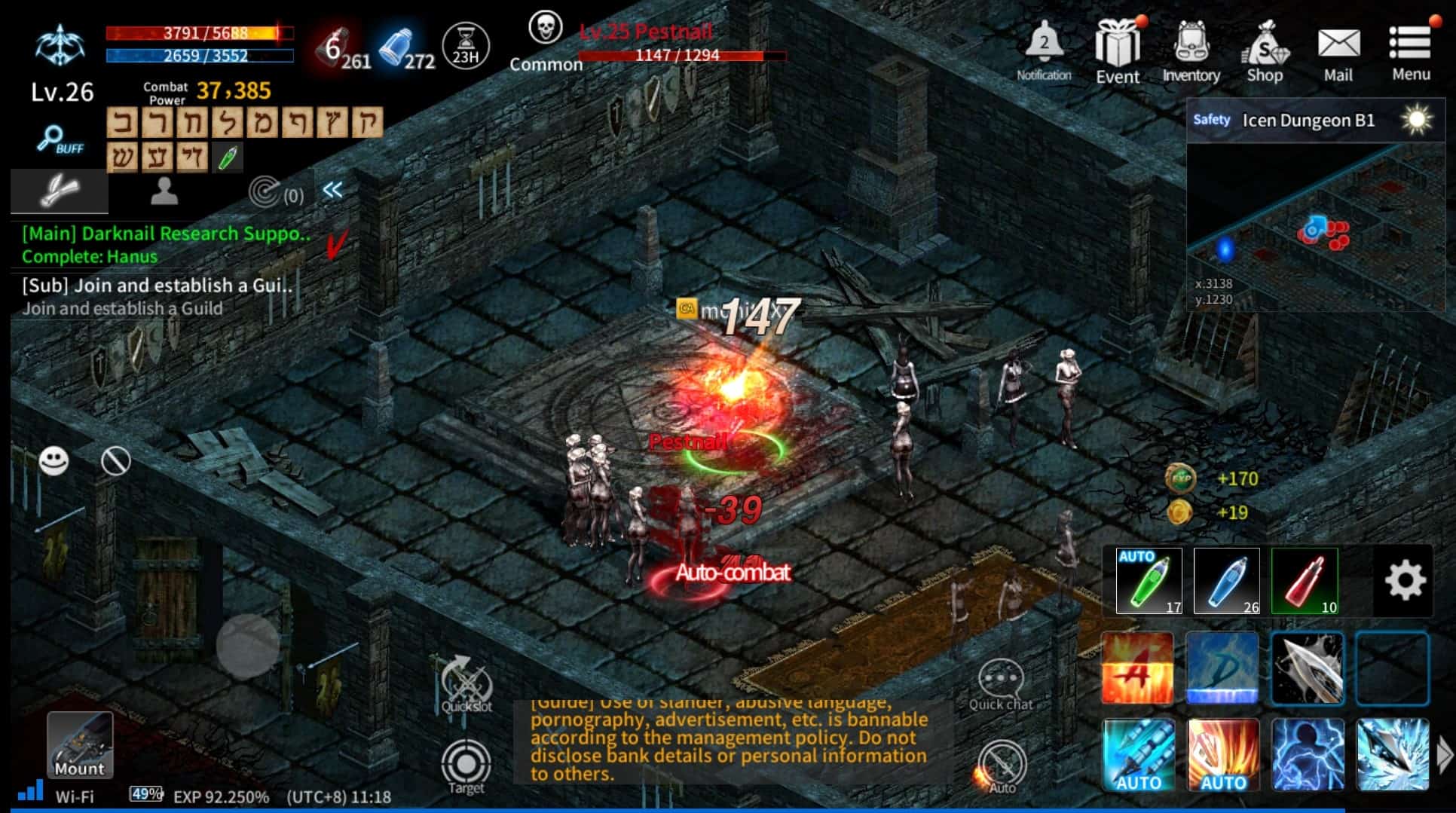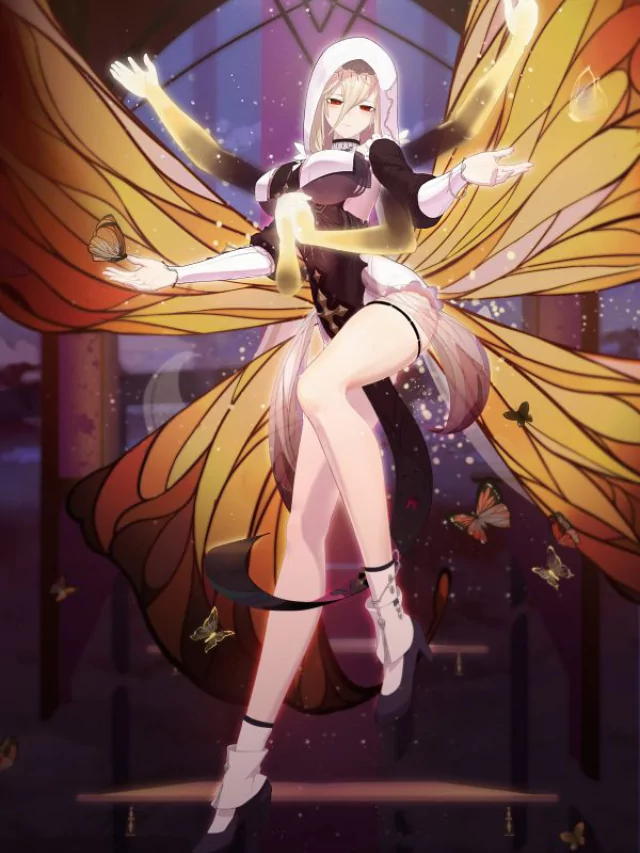What is the MMORPG Game? I guess you are new in the gaming world and wondering about the game genre called MMORPG. In this article, I will give you all the things that you need to know about this game genre.
MMORPG is one of the popular gaming genres of video games, If your new to gaming it is normal to get confused about what it is, dont worry since I will give you all the info that you need to know like what is MMORPG games, what are the differences between RPG, and when did MMORPG begin.
The Meaning of MMORPG?
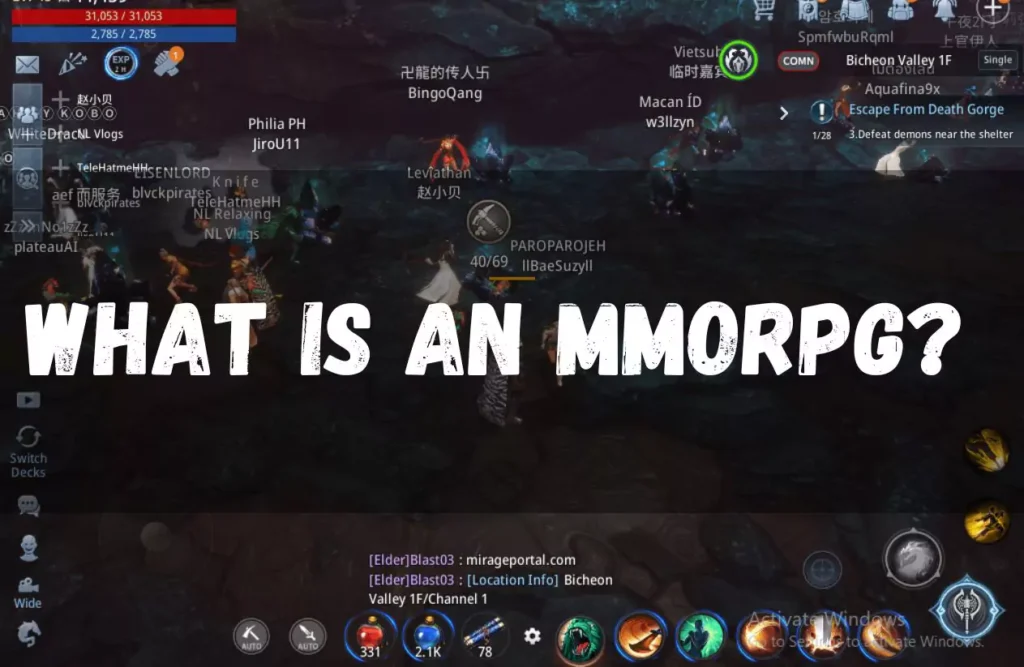
MMORPG stands for Massively Multiplayer Role-playing games.
The “Massively Multiplayer” aspect refers to the vast number of players who inhabit the virtual worlds of these games simultaneously. Picture thousands, even millions, of individuals from all corners of the globe, connected through the power of the internet, jumping on their unique journeys within a shared digital realm.
“Online” signifies that these games are predominantly played over the internet, allowing players to interact with one another in real-time. This interconnectedness forms the foundation for social interaction, cooperative gameplay, and competition that MMORPGs are renowned for.
The “Role-Playing Game” element emphasizes the immersive nature of MMORPGs. Players assume the roles of fictional characters, customizing their appearance, skills, and abilities. They progress through the game by completing quests, engaging in combat, and advancing their characters’ abilities, thus shaping their own virtual destinies.
In essence, MMORPGs offer an unparalleled experience, blending social interaction, exploration, character development, and storytelling into a captivating digital adventure.
To learn more let me give you an insight about the history of MMORPG. Continue reading!
A Brief History of MMORPGs – Unveiling the Early Days of Adventure
Transport yourself back in time to the dawn of online gaming, where the seeds of MMORPGs were first sown. Let’s ride on a captivating journey through the early stages of this gaming genre.
1. MUDs (Multi-User Dungeons) (1978):
The MMORPG revolution began with MUDs, text-based multiplayer games that transported players to fantastical realms through words alone. MUD1, developed by Roy Trubshaw and Richard Bartle, introduced the concept of shared virtual worlds, where players could interact, explore, and engage in role-playing activities.
2. Neverwinter (1991):
Neverwinter, based on the iconic Dungeons & Dragons universe, heralded the advent of graphical MMORPGs. Players were immersed in a visually captivating world as they created their own characters, embarked on quests, and forged alliances in the bustling city of Neverwinter.
3. Diablo (1996):
Although not strictly an MMORPG, Diablo played a crucial role in shaping the genre. It revolutionized action role-playing games and introduced multiplayer elements that fueled the imagination of gamers worldwide. Players connected online, delving into the dark, gothic world together, sharing loot, and battling hordes of demonic creatures.
4. Ultima Online (1997):
Ultima Online marked a significant milestone as one of the first commercially successful MMORPGs. Its vast and immersive world of Britannia was a sandbox for player-driven experiences. Players assumed various professions, engaged in epic battles, erected player housing, formed guilds, and shaped the virtual economy through their actions.
5. EverQuest (1999):
EverQuest forever changed the landscape of MMORPGs, transporting players to the captivating realm of Norrath. With its stunning 3D graphics, immersive lore, and group-based gameplay, it captured the hearts and minds of millions. Players formed alliances, challenged ferocious creatures, embarked on epic quests, and forged friendships that transcended the boundaries of the virtual world.
6. Ragnarok Online (2002):
Ragnarok Online emerged as a sensation in the Asian gaming market, enchanting players with its charming anime-inspired visuals and addictive gameplay. Set in a colorful world influenced by Norse mythology, players chose from a multitude of classes and engaged in quests, PvP battles, and social activities like guilds and player-run markets.
The evolution of MMORPGs from the text-based realms of MUDs to the vast, immersive worlds of today is a testament to the power of human imagination and the desire for shared experiences. As technology continues to advance, we eagerly anticipate the future of MMORPGs, where virtual worlds will become even more immersive, communities will grow stronger, and players will embark on grand adventures that blur the lines between reality and the digital realm.
While this article provides a glimpse into the fascinating history of MMORPGs, it merely scratches the surface. Countless other notable games have contributed to this genre’s evolution, and the stories of their impact and innovation continue to shape the landscape of online gaming.
Gameplay Mechanics and Character Progression
Character Creation and Customization:
In the realm of MMORPGs, the journey begins with the exciting process of character creation. As a player, you are presented with a plethora of options to shape your virtual alter ego.
From choosing a race and class to customizing physical features and personality traits, the possibilities are vast. Whether you aspire to be a noble warrior, a cunning rogue, a powerful mage, or whatever the game called it, the character creation process allows you to bring your imagination to life.
With each choice, you carve a unique path, making your character an extension of your own personality and play style.
Questing and Exploration:
Once your character is born into the virtual world, you are set free to explore vast and immersive landscapes. MMORPGs offer a rich tapestry of quests and missions, each with its storyline and objectives.
These quests serve as your guide, leading you through the intricate web of the game’s lore. From epic battles against fearsome creatures to heartwarming encounters with non-player characters, each quest presents new challenges and opportunities for growth.
As you join on these adventures, you unravel the mysteries of the game’s universe, uncover hidden treasures, and forge new alliances.
Combat Systems and Classes:
Combat lies at the heart of any MMORPG, and the gameplay mechanics are carefully designed to provide an exhilarating experience.
MMORPGs offer diverse combat systems, ranging from strategic turn-based battles to fast-paced real-time action.
As a player, you can choose from a wide array of character classes, each with its own unique set of abilities and playstyles. Whether you prefer to unleash devastating spells from afar or engage in up-close melee combat, there’s a class that suits your desired play style.
Mastering your chosen class’s abilities and tactics is key to prevailing in battles against formidable foes and other players in player-versus-player encounters.
Leveling Up and Skill Development:
Progression is a fundamental aspect of MMORPGs, and it is achieved through leveling up and skill development. As you complete quests, defeat enemies, and explore the game world, you earn experience points that contribute to your character’s advancement.
With each level gained, you unlock new abilities, spells, and talents, enhancing your character’s power and versatility. Skill development allows you to customize your character further, choosing specific paths and specializations that align with your desired playstyle.
Whether you opt for brute strength, arcane mastery, or stealthy finesse, the choices you make shape your character’s growth and capabilities.
In the vast realm of MMORPGs, gameplay mechanics, and character progression form the foundation of an unforgettable journey.
From the moment of character creation to the thrill of leveling up and mastering new skills, each step is a testament to the immersive and captivating nature of these online worlds. So, don your virtual armor, ready your weapons, and prepare to embark on an adventure of a lifetime in the ever-evolving realm of MMORPGs.
The Social Aspect: Interacting with Players
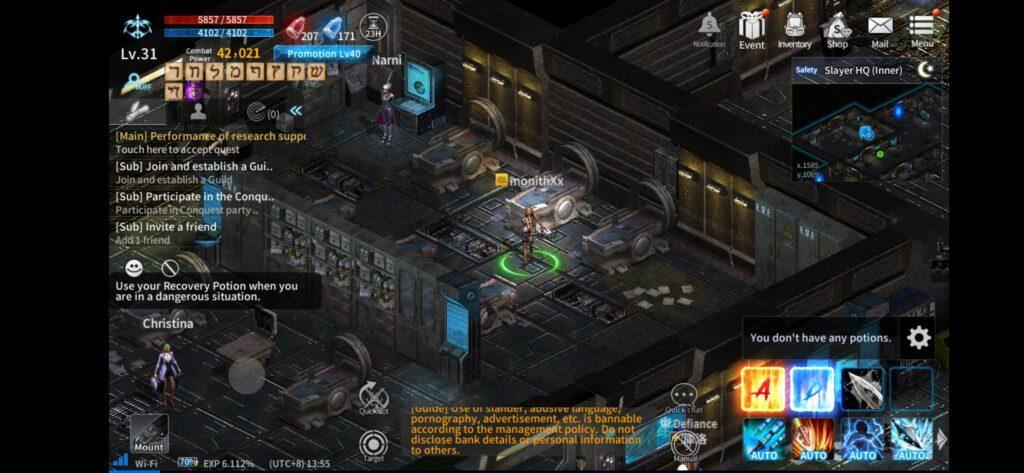
Virtual Communities and Guilds:
One of the most enchanting aspects of MMORPGs is the opportunity to connect and interact with a vibrant community of fellow players. These virtual communities form the backbone of the game, where friendships are forged, alliances are made, and epic adventures are embarked upon together.
Within the vast digital realms, players have the option to join guilds, which are organized groups of like-minded individuals working towards common goals.
Guilds offer a sense of belonging, camaraderie, and support as players band together to conquer challenges, share knowledge, and explore the game’s content as a unified force. Through chat systems, forums, and in-game events, players can socialize, strategize, and build lifelong friendships.
Player vs. Player (PvP) and Player vs. Environment (PvE):
MMORPGs provide players with a choice between engaging in thrilling player vs. player (PvP) combat or tackling the formidable challenges of player vs. environment (PvE) content. PvP battles pit players against each other, allowing for competitive and skill-based encounters.
Whether it’s engaging in one-on-one duels or participating in large-scale battlegrounds, the PvP aspect adds an adrenaline-pumping dimension to the game, where players can prove their prowess and earn recognition among their peers.
On the other hand, PvE content focuses on cooperative gameplay, where players join forces to overcome challenging dungeons, raids, and world bosses. These group activities require coordination, teamwork, and strategic planning to emerge victorious.
Participating in PvE encounters not only rewards players with powerful loot and experience but also fosters a sense of accomplishment and camaraderie as players work together towards a common objective.
Group Activities and Raids:
MMORPGs offer a range of group activities that go beyond PvP and PvE encounters. These activities provide opportunities for players to bond, challenge themselves, and reap greater rewards.
One such activity is raids, which are large-scale battles against powerful foes that require a coordinated group effort to succeed. Raids often demand precise coordination, communication, and a deep understanding of each player’s role within the group.
The exhilaration of defeating a daunting raid boss and the satisfaction of obtaining rare loot make raids memorable and highly sought-after experiences.
Additionally, MMORPGs offer tons of group-centric activities such as dungeon runs, where players navigate through treacherous labyrinths filled with enemies and traps, and cooperative quests that encourage teamwork and collaboration.
Engaging in these group activities not only provides a sense of shared accomplishment but also strengthens the bonds among players, fostering a vibrant and thriving community.
In the world of MMORPGs, the social aspect of interacting with players brings an added layer of depth and excitement to the gameplay experience.
Whether it’s joining virtual communities, engaging in fierce PvP battles, conquering challenging PvE content, or embarking on epic group activities, the interactions with fellow players create a sense of immersion and forge lasting memories.
MMORPG Genres (themes) and Settings
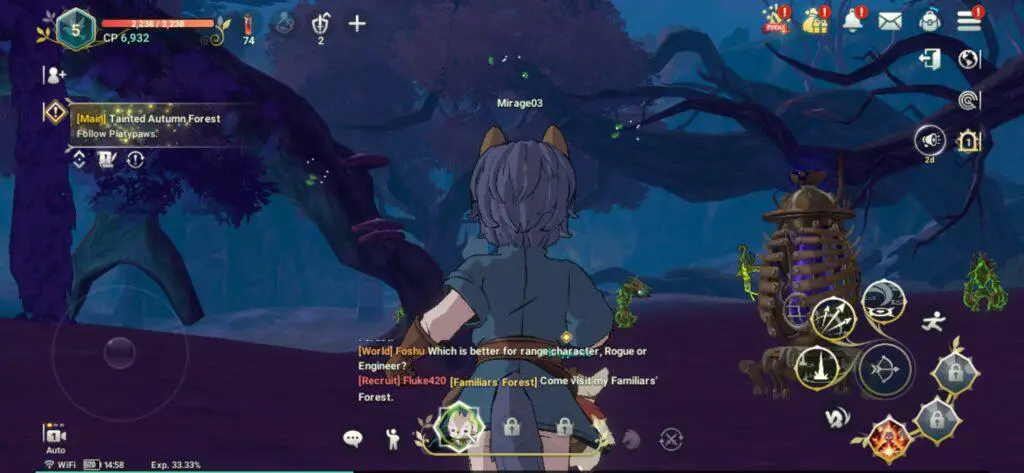
Fantasy World
One of the most prevalent and beloved genres in the world of MMORPGs is fantasy. These immersive virtual worlds transport players into realms filled with magic, mythical creatures, and epic adventures.
From sprawling landscapes adorned with lush forests and towering mountains to mystical cities and enchanted dungeons, fantasy MMORPGs offer a rich tapestry of imaginative settings.
Players can assume the roles of brave knights, powerful wizards, nimble archers, or any other fantastical archetype, as they embark on quests to save kingdoms, unravel ancient prophecies, and battle formidable dragons and dark forces.
The allure of fantasy MMORPGs lies in their ability to transport players to extraordinary realms where anything is possible, allowing them to live out their heroic fantasies in an ever-expanding universe.
Science Fiction Settings
Beyond the realm of fantasy, MMORPGs also explore the vast possibilities of science fiction settings. These futuristic worlds present players with awe-inspiring landscapes, advanced technology, and otherworldly civilizations. In science fiction MMORPGs, players can step into the shoes of intrepid space explorers, cybernetic warriors, or intergalactic traders.
From traversing alien planets to engaging in space battles and uncovering the mysteries of the cosmos, science fiction MMORPGs offer an exhilarating departure from traditional fantasy settings. The allure of these games lies in their ability to transport players to distant galaxies and immerse them in futuristic narratives filled with cutting-edge technology, artificial intelligence, and thrilling adventures.
Historical and Realistic Environments
While fantasy and science fiction dominate the MMORPG landscape, there is also a place for MMORPGs that delve into historical and realistic settings. These games strive to recreate specific periods in history or depict real-world locations with remarkable detail.
Whether it’s exploring ancient civilizations, reliving medieval times, or immersing oneself in modern urban environments, these MMORPGs offer players a chance to experience historical events, customs, and cultures.
Players can take on roles such as knights, samurais, or even everyday citizens, as they navigate historically accurate cities, engage in political intrigues, and partake in epic battles based on real-world events. The appeal of historical and realistic MMORPGs lies in their ability to provide a blend of educational value, immersion, and a deep sense of connection with the past.
In the diverse landscape of MMORPGs, players can choose from a range of genres and settings. Whether they yearn for the enchantment of fantasy worlds, the thrill of science fiction settings, or the immersion of historical and realistic environments, MMORPGs offer a multitude of experiences to suit every player’s taste.
So, venture forth and explore the vast realms that these games have to offer, and let your imagination run wild in the genre and setting that captivates you the most.
The Future of MMORPGs: Innovations and Trends

Imagine a world where MMORPGs become even more incredible, where the boundaries between reality and virtual realms blur, and where the future of gaming holds endless possibilities.
As technology continues to advance, the future of MMORPGs is poised to revolutionize the way we play and experience these captivating virtual worlds.
Let’s delve into the exciting innovations and trends that lie ahead, igniting our imaginations and fueling our anticipation.
The Virtual Reality Of MMORPG
Step into the realm of virtual reality (VR) integration, where the lines between the physical and virtual worlds fade away.
Picture yourself donning a VR headset and finding yourself fully immersed in a mesmerizing MMORPG universe.
Feel the rush of adrenaline as you navigate breathtaking landscapes, interact with other players in real-time, and engage in intense combat that feels as though you are truly there. VR integration promises to transport us to unimaginable heights of immersion, making every adventure feel more vivid, thrilling, and tangible than ever before.
But the future of MMORPGs doesn’t stop at VR integration alone. Prepare to embrace dynamic and living worlds that respond to your every action and decision. Gone are the static environments of old; instead, you’ll find a dynamic realm that evolves and adapts based on player interactions. Your choices will shape the very fabric of the virtual world, with evolving storylines, dynamic events, and shifting alliances.
This level of dynamism will immerse you in a living, breathing world, where your agency becomes the driving force behind the game’s narrative, and where your impact on the virtual realm feels tangible and meaningful.
Player-Generated Content MMORPG
As we peer into the future, another trend emerges the inclusion of player-generated content. MMORPG developers are recognizing the immense creative potential of their player communities and are opening doors for players to become co-creators of the game world.
Imagine the thrill of crafting your quests, designing intricate dungeons, or even fashioning unique items that shape the very fabric of the MMORPG universe.
This trend empowers players, giving them a sense of ownership and a deeper connection to the game. With player-generated content, MMORPGs will continue to evolve and remain fresh, as the player community contributes their imaginative ideas, fostering a vibrant and collaborative gaming experience.
Cryptocurrency and MMORPG
Now, envision a future where the exciting worlds of MMORPGs intersect with the transformative power of cryptocurrencies. Today, we are already witnessing the emergence of crypto-based MMORPGs that allow players to earn real money through in-game activities. These pioneering games provide a glimpse into the incredible potential that cryptocurrencies hold for the future of the genre.
In these crypto-based MMORPGs, players can engage in various in-game tasks and activities that generate valuable digital assets, which can be exchanged for cryptocurrencies or other forms of real-world value. This innovative integration of cryptocurrencies into MMORPGs brings a new level of economic freedom and empowerment to players. It allows them to truly own their in-game assets and reap tangible rewards for their time and effort invested in the virtual realm.
Looking ahead, the future of crypto-based MMORPGs holds the promise of addressing the current drawbacks and limitations of these games. As technology and infrastructure continue to evolve, we can anticipate improvements in scalability, transaction speeds, and user experience within the crypto ecosystem. These advancements will enhance the fluidity of in-game transactions, making it easier for players to buy, sell, and trade assets securely and efficiently.
Additionally, the future of crypto-based MMORPGs will likely see the development of more sophisticated and user-friendly blockchain systems that ensure fairness, transparency, and trust in the virtual economy. Smart contract technology can enable automated and secure transactions, minimizing the risk of fraud and creating a level playing field for all players.
Furthermore, the integration of blockchain technology may provide new avenues for player-driven economies within MMORPGs.
Through decentralized marketplaces, players could directly trade their in-game assets with each other, fostering a thriving virtual economy where supply and demand dictate prices. This peer-to-peer trading could empower players by removing intermediaries and giving them more control over their in-game financial activities.
As the potential of cryptocurrencies continues to unfold, we can envision a future where crypto-based MMORPGs become even more immersive and rewarding. Players may be able to earn cryptocurrencies that hold real-world value, creating opportunities for financial independence and entrepreneurship within the virtual realm. This integration of cryptocurrencies not only adds an exciting economic dimension to MMORPGs but also aligns with the broader trend of decentralized and user-driven systems that are shaping our world.
The future of MMORPGs, coupled with the transformative power of cryptocurrencies, promises a paradigm shift in how we perceive and engage with virtual worlds. So, brace yourself for a future where the lines between gaming and real-world economics blur, where the virtual realm becomes a gateway to financial opportunities, and where players truly own and control their digital assets. The future is beckoning, and the fusion of MMORPGs, virtual reality, and cryptocurrencies is poised to redefine our gaming experiences like never before.
Bottom Line
I apologize for the length of this article, but I assure you it’s worth the read. I don’t just simply provide a direct answer to the question of “What are MMORPG games”, but I’ll also paint a broader picture and delve into all the essential details you need to know. By the end of this article, you’ll have a comprehensive understanding of MMORPGs and what to expect from them.
I believe in offering a comprehensive overview to ensure you’re well-informed about this captivating gaming genre. From defining MMORPGs and exploring their unique features to discussing the differences compared to other RPGs, I’ll cover it all. Additionally, I’ll take you on a journey through the historical beginnings of MMORPGs, providing valuable context.
I apologize for the length of this article, but I assure you it’s worth the read. I won’t simply provide a direct answer to the question “What is MMORPG games?”, but I’ll also paint a broader picture and delve into all the essential details you need to know. By the end of this article, you’ll have a comprehensive understanding of MMORPGs and what to expect from them.
I believe in offering a comprehensive overview to ensure you’re well-informed about this captivating gaming genre. From defining MMORPGs and exploring their unique features to discussing the differences compared to other RPGs, I’ll cover it all. Additionally, I’ll take you on a journey through the historical beginnings of MMORPGs, providing valuable context.
So fear not, this article is designed to equip you with everything you need to know about MMORPGs. I hope that through this comprehensive exploration, I can provide you with the information you seek and satisfy your curiosity about what MMORPG games truly are.
What does MMORPG mean in games?
MMORPG means Massively Multiplayer Online Role Playing Games. It is a kind of game that is a mix of RPG (Role Playing Games) and MMO games (Massively Multiplayer Online Games)
What is the difference between MMO and MMORPG?
MMORPG is a role-playing game that has a massive number of players while MMO is any game genre that is an online game that has a massive number of players that can interact with each other it can be a shooter game, strategy game, battle royal, etc.
Is An MMORPG the same as an RPG?
They are almost the same but not exactly the same, they have the same concept which is role-player games, the only difference is MMORPG has a massive number of players that can interact with each other while RPG is sometimes single-player or only have option to interact with other players.
